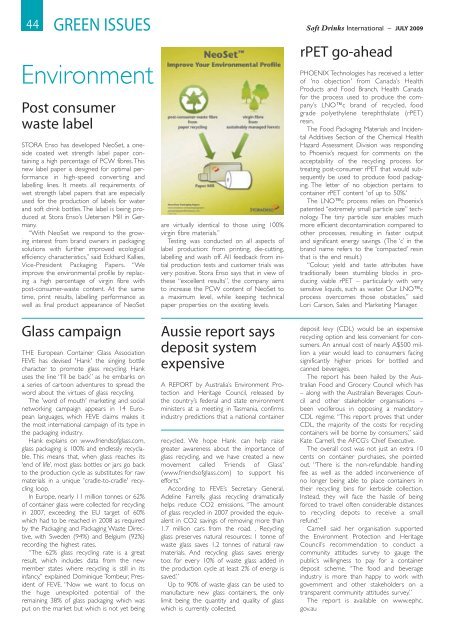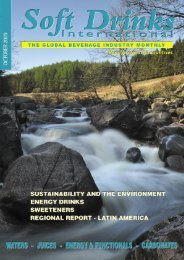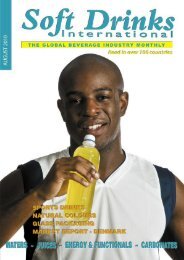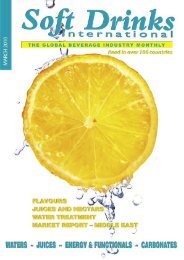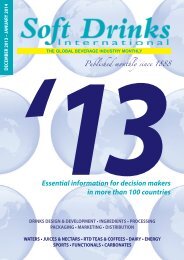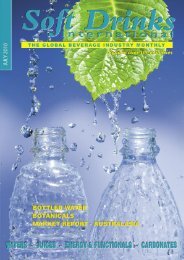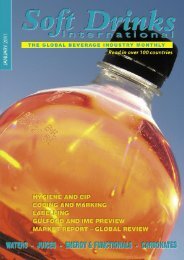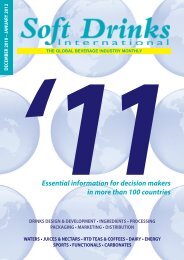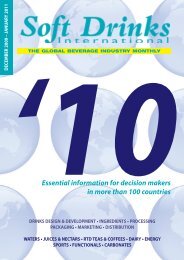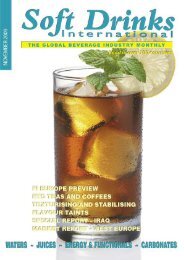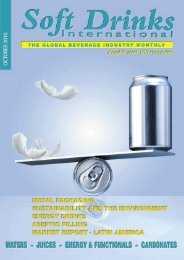SDI JUL09.qxd - Soft Drinks International
SDI JUL09.qxd - Soft Drinks International
SDI JUL09.qxd - Soft Drinks International
You also want an ePaper? Increase the reach of your titles
YUMPU automatically turns print PDFs into web optimized ePapers that Google loves.
44 GREEN ISSUES<br />
<strong>Soft</strong> <strong>Drinks</strong> <strong>International</strong> – JULY 2009<br />
Environment<br />
Post consumer<br />
waste label<br />
STORA Enso has developed NeoSet, a oneside<br />
coated wet strength label paper containing<br />
a high percentage of PCW fibres. This<br />
new label paper is designed for optimal performance<br />
in high-speed converting and<br />
labelling lines. It meets all requirements of<br />
wet strength label papers that are especially<br />
used for the production of labels for water<br />
and soft drink bottles. The label is being produced<br />
at Stora Enso’s Uetersen Mill in Germany.<br />
“With NeoSet we respond to the growing<br />
interest from brand owners in packaging<br />
solutions with further improved ecological<br />
efficiency characteristics,” said Eckhard Kallies,<br />
Vice-President Packaging Papers. “We<br />
improve the environmental profile by replacing<br />
a high percentage of virgin fibre with<br />
post-consumer-waste content. At the same<br />
time, print results, labelling performance as<br />
well as final product appearance of NeoSet<br />
Glass campaign<br />
THE European Container Glass Association<br />
FEVE has devised 'Hank' the singing bottle<br />
character to promote glass recycling. Hank<br />
uses the line “I’ll be back” as he embarks on<br />
a series of cartoon adventures to spread the<br />
word about the virtues of glass recycling.<br />
The 'word of mouth' marketing and social<br />
networking campaign appears in 14 European<br />
languages, which FEVE claims makes it<br />
the most international campaign of its type in<br />
the packaging industry.<br />
Hank explains on www.friendsofglass.com,<br />
glass packaging is 100% and endlessly recyclable.<br />
This means that, when glass reaches its<br />
‘end of life’, most glass bottles or jars go back<br />
to the production cycle as substitutes for raw<br />
materials in a unique 'cradle-to-cradle' recycling<br />
loop.<br />
In Europe, nearly 11 million tonnes or 62%<br />
of container glass were collected for recycling<br />
in 2007, exceeding the EU target of 60%<br />
which had to be reached in 2008 as required<br />
by the Packaging and Packaging Waste Directive,<br />
with Sweden (94%) and Belgium (92%)<br />
recording the highest rates.<br />
“The 62% glass recycling rate is a great<br />
result, which includes data from the new<br />
member states where recycling is still in its<br />
infancy,” explained Dominique Tombeur, President<br />
of FEVE. “Now we want to focus on<br />
the huge unexploited potential of the<br />
remaining 38% of glass packaging which was<br />
put on the market but which is not yet being<br />
are virtually identical to those using 100%<br />
virgin fibre materials.”<br />
Testing was conducted on all aspects of<br />
label production: from printing, die-cutting,<br />
labelling and wash off. All feedback from initial<br />
production tests and customer trials was<br />
very positive. Stora Enso says that in view of<br />
these “excellent results”, the company aims<br />
to increase the PCW content of NeoSet to<br />
a maximum level, while keeping technical<br />
paper properties on the existing levels.<br />
Aussie report says<br />
deposit system<br />
expensive<br />
A REPORT by Australia’s Environment Protection<br />
and Heritage Council, released by<br />
the country’s federal and state environment<br />
ministers at a meeting in Tasmania, confirms<br />
industry predictions that a national container<br />
recycled. We hope Hank can help raise<br />
greater awareness about the importance of<br />
glass recycling, and we have created a new<br />
movement called 'Friends of Glass'<br />
(www.friendsofglass.com) to support his<br />
efforts.”<br />
According to FEVE’s Secretary General,<br />
Adeline Farrelly, glass recycling dramatically<br />
helps reduce CO2 emissions. “The amount<br />
of glass recycled in 2007 provided the equivalent<br />
in CO2 savings of removing more than<br />
1.7 million cars from the road. . Recycling<br />
glass preserves natural resources: 1 tonne of<br />
waste glass saves 1.2 tonnes of natural raw<br />
materials. And recycling glass saves energy<br />
too: for every 10% of waste glass added in<br />
the production cycle at least 2% of energy is<br />
saved.”<br />
Up to 90% of waste glass can be used to<br />
manufacture new glass containers, the only<br />
limit being the quantity and quality of glass<br />
which is currently collected.<br />
rPET go-ahead<br />
PHOENIX Technologies has received a letter<br />
of 'no objection' from Canada’s Health<br />
Products and Food Branch, Health Canada<br />
for the process used to produce the company’s<br />
LNOc brand of recycled, food<br />
grade polyethylene terephthalate (rPET)<br />
resin.<br />
The Food Packaging Materials and Incidental<br />
Additives Section of the Chemical Health<br />
Hazard Assessment Division was responding<br />
to Phoenix’s request for comments on the<br />
acceptability of the recycling process for<br />
treating post-consumer rPET that would subsequently<br />
be used to produce food packaging.<br />
The letter of no objection pertains to<br />
container rPET content 'of up to 50%.'<br />
The LNOc process relies on Phoenix’s<br />
patented “extremely small particle size” technology.<br />
The tiny particle size enables much<br />
more efficient decontamination compared to<br />
other processes, resulting in faster output<br />
and significant energy savings. (The ‘c’ in the<br />
brand name refers to the ‘compacted’ resin<br />
that is the end result.)<br />
“Colour, yield and taste attributes have<br />
traditionally been stumbling blocks in producing<br />
viable rPET – particularly with very<br />
sensitive liquids, such as water. Our LNOc<br />
process overcomes those obstacles,” said<br />
Lori Carson, Sales and Marketing Manager.<br />
deposit levy (CDL) would be an expensive<br />
recycling option and less convenient for consumers.<br />
An annual cost of nearly A$500 million<br />
a year would lead to consumers facing<br />
significantly higher prices for bottled and<br />
canned beverages.<br />
The report has been hailed by the Australian<br />
Food and Grocery Council which has<br />
– along with the Australian Beverages Council<br />
and other stakeholder organisations –<br />
been vociferous in opposing a mandatory<br />
CDL regime. “This report proves that under<br />
CDL, the majority of the costs for recycling<br />
containers will be borne by consumers,” said<br />
Kate Carnell, the AFCG’s Chief Executive.<br />
The overall cost was not just an extra 10<br />
cents on container purchases, she pointed<br />
out. “There is the non-refundable handling<br />
fee as well as the added inconvenience of<br />
no longer being able to place containers in<br />
their recycling bins for kerbside collection.<br />
Instead, they will face the hassle of being<br />
forced to travel often considerable distances<br />
to recycling depots to receive a small<br />
refund.”<br />
Carnell said her organisation supported<br />
the Environment Protection and Heritage<br />
Council’s recommendation to conduct a<br />
community attitudes survey to gauge the<br />
public’s willingness to pay for a container<br />
deposit scheme. “The food and beverage<br />
industry is more than happy to work with<br />
government and other stakeholders on a<br />
transparent community attitudes survey.”<br />
The report is available on www.ephc.<br />
gov.au


